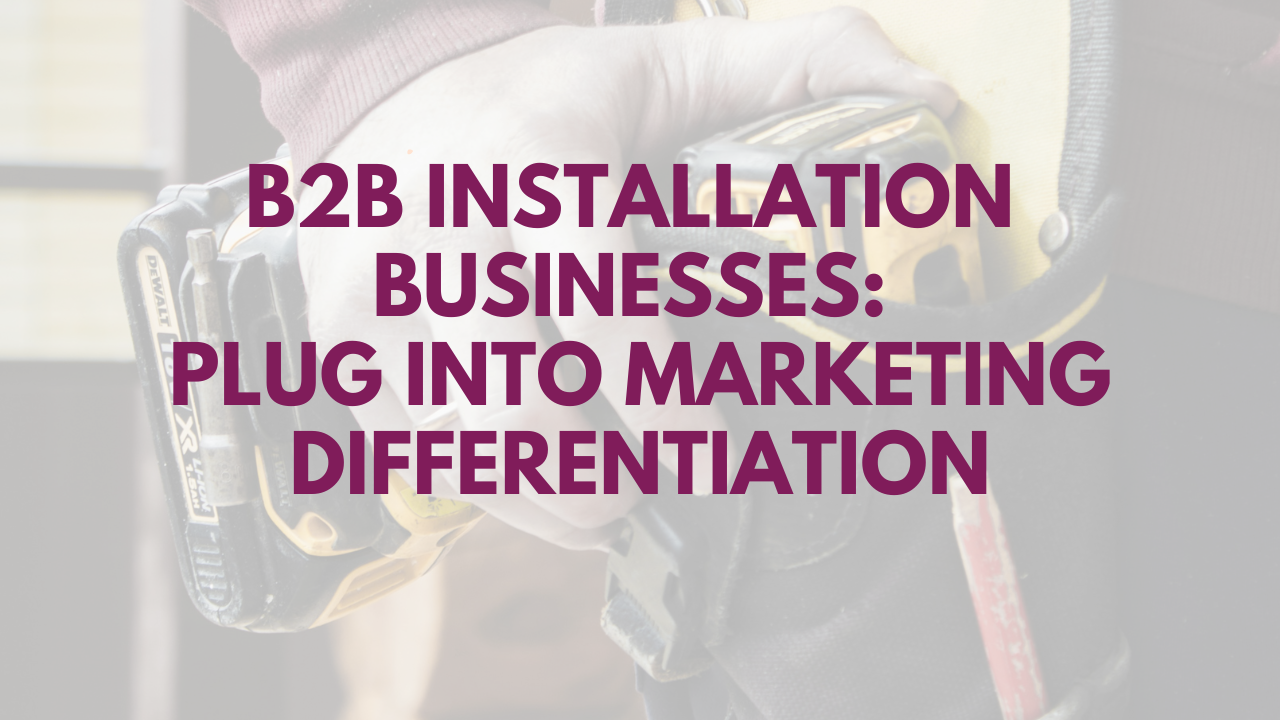I’m kicking off 2025 with a new client; a company offering B2B electrical services, specializing in the installation of electrical systems for commercial and residential properties in the UK.
Hands-on, installation-based service business involve installing, repairing, or maintaining physical infrastructure. These businesses have specific marketing issues they needs to solve beyond those of my other remote service clients.
Marketing on-site installation services
My client is the owner of the business and is busy most days on-site. He currently works with a business coach but this is the first time he hse partnered with a marketing professional (me) in a strategic capacity although he does use a freelance webmaster.
The business offers a wide range of services, including electrical installations, emergency lighting, fire alarm installation, air conditioning, and ventilation (the UK equivalent of HVAC). The backend of recurring revenue services such as ongoing maintenance and service contracts are welcome too.
Standing out from the competition can be tough. Many firms have the same look and feel. Every competitor likely has a van, staff overalls and use the same equipment. Marketing messages in this sector contain the usual vague service claims – we turn up on time – which should be in their SOPs and not their marketing. Claims like “passionate about fire alarm installation” or “established in 2008” don’t cut it as examples of why they should be hired.
My client is looking for a content strategy and execution that demonstrates expertise and puts his firm top of mind with customers.
Below are three areas to consider when marketing this type of B2B service.
Location Matters—Or Does It?
For on-site services, the business’s location is often a key concern for potential clients. Many customers expect a provider’s office or base to be nearby, even if the actual service doesn’t require it. Unlike software companies or data analysts, who can market globally and work across time zones, on-site service providers face geographic constraints. The challenge is finding the right balance—leveraging local credibility while making it clear that modern efficiencies matter more than a street address.
I spent several years working for a property management company that managed properties right across the country. The firm had a modern, tech-savvy approached that handled many tasks remotely. About 70% of our services, including paperwork, online accounting, and payments, had nothing to do with physical location. The rest was managed through a network of regional contractors. And yet, every time a landlord or residents’ management company (RMC) inquired about our services, their first question was always: Where are you based?
The reality? Our head office location was mostly irrelevant. But old habits die hard. Clients instinctively tied service quality to proximity, even when it didn’t matter.
When it comes to marketing this kind of service, then, there is always quite a bit of messaging to be done about location and proximity to new clients. Do you emphasize your local presence to align with customer expectations? Or do you highlight your ability to serve a wider region, breaking free from the assumption that location always matters?
Using client cases studies
For many HVAC and installation firms, the reality is that there’s little to distinguish one from the next. They’re installing the same systems, using the same equipment, the same materials, and often even the same industry jargon. To the client, swapping one service provider for another wouldn’t make much of a difference—except for a different logo on the van and a new set of overalls.
So, if the work itself (on the surface) isn’t unique, what will actually make a company stand out? The answer isn’t in what you do but how you do it—your expertise, your customer experience, and the way you communicate the value you bring beyond just the installation. This is the message for your marketing campaigns.
By telling the story of real challenges overcome and problems solved, B2B installation firms can build credibility and attract new customers who see the value in their expertise.
Tangible deliverables and decision-making hierarchies
For my B2B electrical services client, B2B marketing should emphasize tangible, immediate outcomes. Whilst B2B services that deliver reports, legal guidance, or new work systems, installation firms provide visible, functional results: ventilation systems that change the room instantly, fire alarms that work from day one.
Installation firms typically work with procurement managers, contractors, or facility managers—and not the C-level executives or board members that many of my other clients (management consultants or software developers, for instance) often engage with.
As procurement and facility managers may need to justify their choices to management committees, a strong marketing message should address the technical aspects of the service but also the ease of implementation, reliability, and the ability to deliver on-time, problem-free installations. There is a lot of opportunity to highlight how your services provide instant relief from an ongoing company-wide client problem.
–
Content creates customers
An effective content strategy needs to be relevant and specific to your ideal customer at all times. Learn how to create and write great content for your service business with my B2B Content Strategy Program is a two-hour online learning session that coaches participants in how to write and deliver effective marketing content for their business.
